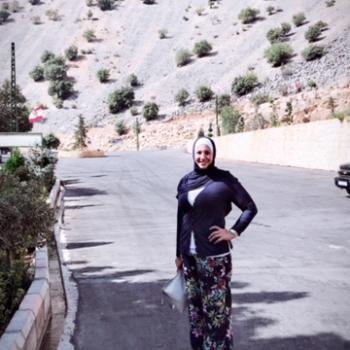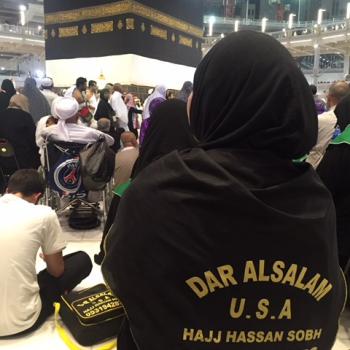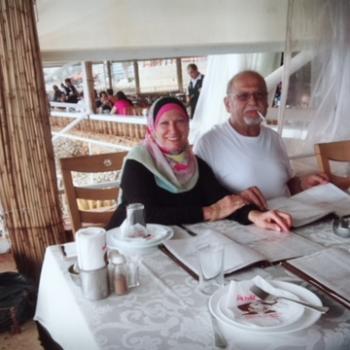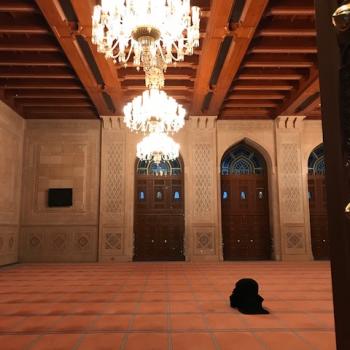Ashura begins
 There was a quiet beauty in the South of Lebanon this weekend as villages prepared for the commemoration of Ashura and remembrance of Imam Hussain’s (as) stand against oppression.
There was a quiet beauty in the South of Lebanon this weekend as villages prepared for the commemoration of Ashura and remembrance of Imam Hussain’s (as) stand against oppression.
Driving through the villages, I watched as communities came together to decorate for the activities that will stretch over the first ten days of Muharram.
At two locations, I stopped to take in the immensity of the moment. Men and women, young and old, quietly working together to erect flags, raise banners and post images.
Sending up a silent dua (supplication), I asked God to bless the men and women working on such a meaningful occasion.
This is the first time that I am in Lebanon during such a sacred month. There is so much to absorb and learn during this time and I am grateful I get to be here for the experience.
notations: (pbuh – peace and blessings upon him) and (as – a’allayhi salam – peace be upon him)
It’s not about your attendance
Before I talk about Ashura, Hussain (as), the Battle of Karbala and the work being done to live out his legacy, let me share my own thoughts on spending this time in reflection.
Admittedly, I do not often attend nightly lectures during Ashura. While living in America, I would do my best to attend lectures, especially when speakers came from other communities.
Having worked in the sphere of non-profits and community leadership, I would pick and choose where I frequent and have my reasoning for it.
That is my choice and my business. I do not feel that others have the right to interfere in my decision making.
Just because you do not wear black or attend a house of worship or lecture hall, does not mean you are not following the faith or living the legacy of Ahlul Bayt (family of the Prophet) or neglecting the commemoration of Ashura.
Ashura is more than a ten or forty day time frame for people. For the Shia’a community and those who observe the mourning of this period in Islamic history, it is a time of remembrance, commemoration, and opportunity.
During this time, people re-evaluate their efforts in the fight against tyranny and oppression.
As a globally conscious Muslim and activist, I live the legacy of Hussain (as) each day.
Working throughout the years, I made every effort to fight against oppressive policies, laws, and governments.
Protesting injustice, persecution, and discrimination, I and countless others have devoted decades of our lives to helping others overcome adversity and oppression.
This is what it means to commemorate Hussain’s (as) life and live his legacy. It is so much more than ten days of lectures, lamentation, and recitations.
It’s a personal choice
 People do not have the right to police others when it comes to their commitment to knowledge of faith or attendance in places of communal worship.
People do not have the right to police others when it comes to their commitment to knowledge of faith or attendance in places of communal worship.
A person’s relationship with God is personal.
Oftentimes we get caught up in socializing in public settings. I find I am more focused when I am alone.
Wherever I choose to be, whether listening to supplication and Qur’an, reading books on the faith or moments in history, or watching a lecture by a scholar abroad, I am connected to God and His message.
Keep doing what makes you happy and content in your relationship with God. He knows and sees all.
“ALLAH knows (all) that is in your hearts.” – Holy Qur’an, Chapter 33, Verse 51
Living the legacy of Hussain (as)
“If Husain had fought to quench his worldly desires…then I do not understand why his sister, wife, and children accompanied him. It stands to reason, therefore, that he sacrificed purely for Islam.” – Charles Dickens
The legacy of Imam Hussain (as) is so much more than ten days of Islamic supplication and lamentation. It is more than simply standing for what is right and just.
Hussain (as) was a man of immense faith, compassion, high moral standards, and exemplary ethics.
His empathy for humanity and commitment to fighting tyrannical regimes and oppressive rulers is recognized throughout history and by extraordinary global leaders and academics.
The praise of Hussain’s (as) stands against Yazid and the inspirational and outspoken leadership of Sayeda Zainab (as) that followed, marks the path of Ahlul Bayt (as) within the Muslim community.
The Battle of Karbala and stand of Hussain (as) was recorded in countless history books and would inspire generations to come.
“I learned from Hussain how to be wronged and be a winner, I learned from Hussain how to attain victory while being oppressed.” ― Mahatma Gandhi
The story of Hussain (as) is a time that invokes abundant grief and sadness among the ummah (nation) who remember the Battle of Karbala and heinous acts of Yazid’s army.
Today, tens of millions continue to visit the shrines of the Prophet Muhammad’s (pbuh) beloved family.
On the 40th of Muharram, 20-25 million people, Muslim and non-Muslim, will be found in Karbala, Iraq, commemorating in what is the considered the largest, most peaceful gathering in the region and world.
As a Muslim following the path of my Prophet and his progeny (pbut), I ask myself each day, “What have I done to live out the legacy of one of the most celebrated and revered revolutionaries in history?”
Who is Hussain Ibn Ali (as – peace be upon him)
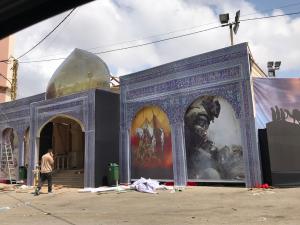 Ashura marks the death of a revolutionary leader, revered for his social justice and stand against oppressiveness and immorality.
Ashura marks the death of a revolutionary leader, revered for his social justice and stand against oppressiveness and immorality.
Hussain ibn Ali (as) was a righteous and objective leader.
The beloved grandson of Islam’s holy Prophet, Muhammad (pbuh– peace and blessings upon him), he is the inspiration behind movements pushing back against injustice and tyranny for centuries.
Killed in the Battle of Karbala in the 7th Century, Hussain (as) is honored by hundreds of millions around the globe.
His valor and stand against the corruption, injustice, and tyranny of Ummayad ruler, Yazid, the illegitimate and oppressive ruler of the time, is respected in history.
Hussain (as) stated that “I will never give Yazid my hand like a man who has been humiliated, nor will I flee like a slave. I have not risen to spread evil or to show off… I only desire to enjoin good values and prevent evil.”
Born into a righteous family
Hussain (as) was born into a blessed family.
The son of Fatima Az-Zahra and Ali Ibn Abi Taleb (as), the daughter and son-in-law and cousin of the Holy Prophet Muhammad (pbuh), their strong character, righteous values, and nonviolent practices were admired by all in the region.
It was the Holy Prophet who raised his children and grandchildren to truly embody all the beautiful aspects of akhlaq (ethics) in Islam.
This is what we strive to follow and imitate.
This moral code serves as the foundation for all Muslims, no matter their school of thought practice or nation of origin.
The morality, piety, and compassion of the Holy Prophet and his family (pbut) was model behavior and defied the societal norms of that time.
The akhlaq of the Holy Prophet Muhammad (pbuh) and his Ahlul Bayt is a source of guidelines for all Muslims to follow.
May God keep us focused on striving to achieve that kind of character.
Standing for what you believe in
Hussain (as) witnessed the decline of morality and rise of corruption within the Muslim Ummah under the rule of Yazid.
Refusing to pledge allegiance to a tyrant, Hussain (as) stood strong in his convictions.
He would not bow to Yazid and knew that in failing to do so, Yazid would seek revenge and put Hussain (as) and his family at risk.

It was a stand that Hussain (as) was willing to make for the sake and protection of Islam.
He refused to allow Yazid to desecrate Islam and the teachings of his grandfather, Muhammad (pbuh).
Though he did not want violence, Hussain (as) was prepared to stand against the unethical leader and followers.
He organized a group of 72 Muslims to accompany him and his family as they traveled to Iraq.
Willing to sacrifice all he had and was, Hussain (as) put Islam, the accurate path of the Prophet Muhammad (pbuh), first.
He pushed back against the tyrannical leadership that threatened the future of Islam and the Muslim Ummah (nation).
Their journey would mark a historical turning point in Islam and would serve as one of the greatest schisms that would impact the greater Muslim Ummah.
The Battle of Karbala
Yazid ordered Hussain (as) and his companions to be attacked.
Still refusing to pledge allegiance to an illegal and oppressive ruler, Hussain (as) forged ahead, remaining strong in his convictions.
Valiantly fighting against a well-equipped army, Hussain (as) did not back down from his principles.
As he and his companions were denied water for three days, they knew that difficulty was ahead.
Yazid’s army killed Hussain’s (as) companions.
Having endured tremendous wounds, Hussain (as) was finally beheaded on the plains of Karbala by the oppressor, Shimr, who was sent by Yazid.
He died fighting injustice with his morality and ethics intact. It was a tragic event and is still commemorated today.
The name of each martyr of Islam is deep-rooted in the hearts of believers. These are the people who stood for justice and the teachings of the Prophet Muhammad (as).
“Death with dignity is better than a life of humiliation.” – Hussain (as)
Standing your ground
A disgraceful people, the army of Yazid took the family of Prophet Muhammad (pbuh) and Hussain (as) captive, parading them, shackled, through the streets to the courtyard of Yazid. Hussain’s (as) head on display.
“Do not think of those who are slain for the cause of Allah as dead. They are alive with their Lord and receive sustenance from Him.” – Holy Qur’an, Surah Ale Imran, 3: 169
During these moments, the truth of Islam and those who bear its flag and carry within them the akhlaq of our beloved Prophet Muhammad (pbuh), was evident.
Sayeda Zainab (as), the sister of Hussain (as), refused submission to Yazid and stood firm to the legacy and principles of her grandfather, Muhammad (pbuh), and her brother, Hussain (as).
With conviction and valor, she criticized and ridiculed Yazid and his counterparts in his own palace.
Berating the Ummayad dynasty, she inspired and uplifted the oppressed and shocked those who stood and watched.
She held the oppressive leadership responsible for the lack of principles within the community.
Her inspirational speeches would be what laid the foundation for future uprisings against despotic leadership and injustice that would come.
You can read her famous speech here.
For some, this is the Ashura that most people do not know about or have a limited understanding of.

Hold tight to your convictions
How many of us are that committed to what we believe in and stand up for?
Colin Kaepernick, an acclaimed athlete who is known more for kneeling during the anthem to protest injustices in the U.S. than his football plays is now the latest social justice rockstar.
Nike ads show just how phenomenal and inspiring standing against injustices can be.
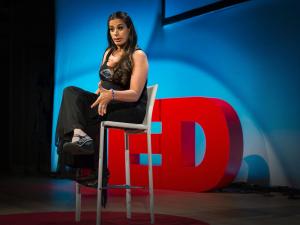

Muslim activists like my dearest sisters, Linda Sarsour, Zahraa Billoo, Dalia Mogahed, and Maysoon Zayid are among countless others that fight each day against injustices around the globe.

These remarkable women and so many others around the world exemplify the courage and bravery of Islam’s most esteemed female leaders.
Whether the issue is Palestine, disabilities, the environment, humanitarian crises, civil rights, or discrimination, there are extraordinary examples of social justice warriors right here in our own communities.

Each day, I pray for the safety of those who are out there on the front lines, fighting hard against oppressive regimes, legislators, big industry, lobbying firms, and sexual aggressors.
May God keep them strong, safe, eloquent, and away from those who do harm. May their bravery and courage be recognized and reinforced and their good deeds rewarded.
Join an organization doing good work
Today, many organizations provide exemplary assistance and support which help to further messages like that of Hussain (as) and Ashura.
Learn more about organizations like Who Is Hussain that provide education, programming, humanitarian aid, and medical support to those in need or the Ashura Project and The 10th Day that provide awareness on the tragedy of Karbala and the legacy of Hussain (as).
It is beautiful to know how people are committed to sharing the message of Hussain (as), his struggle, and Ahlul Bayt’s (as) quest for justice and a more moral and conscious Ummah.
My heart overflows with pride to watch humanitarian efforts provided and supported across the globe. I am inspired by groups that establish and support education and awareness, engaging entire communities in opportunities to learn and develop sustainable projects.
The time and efforts given by Muslims and non-Muslims, joined hand in hand to support those in need of resources, is motivating and moving.
It is time that we begin asking ourselves, “What do I stand for? and How have I contributed to the greater good?”


